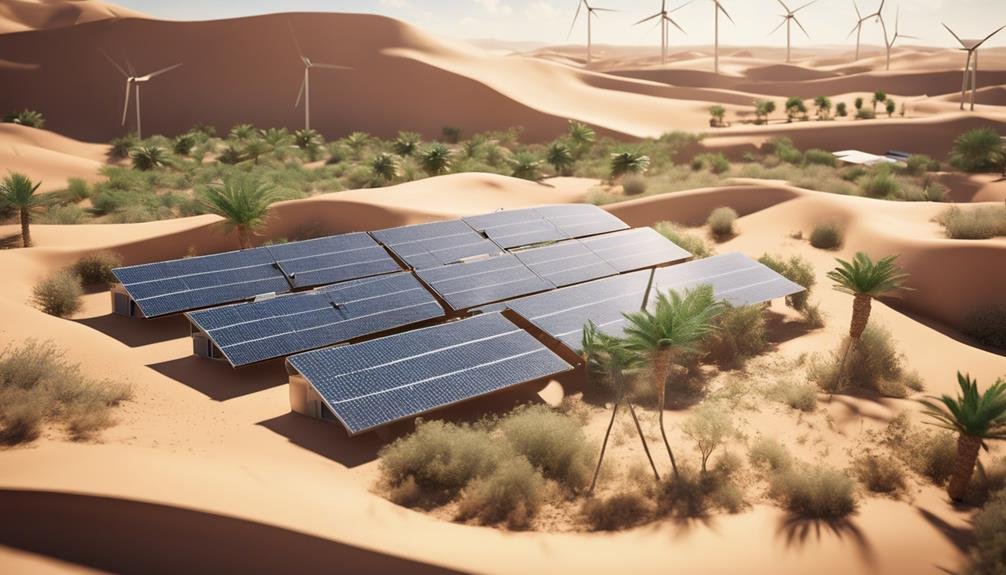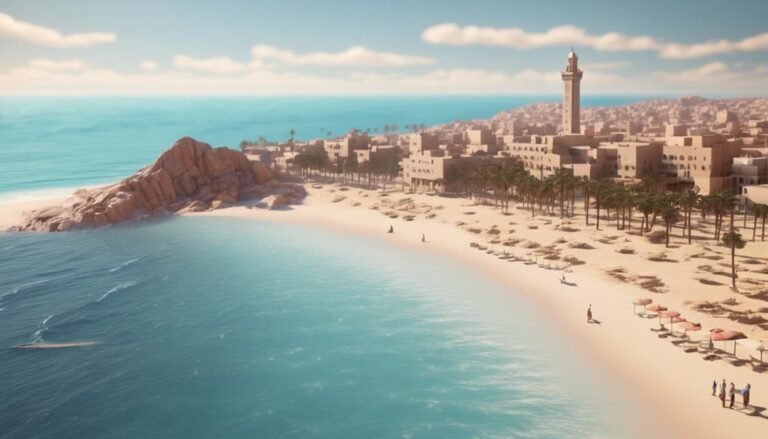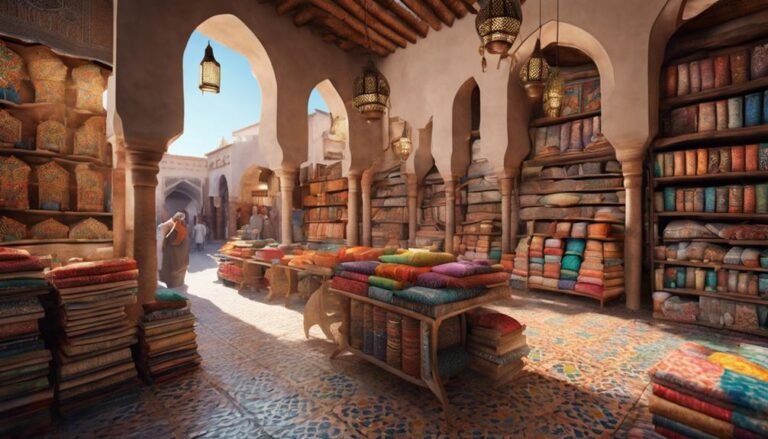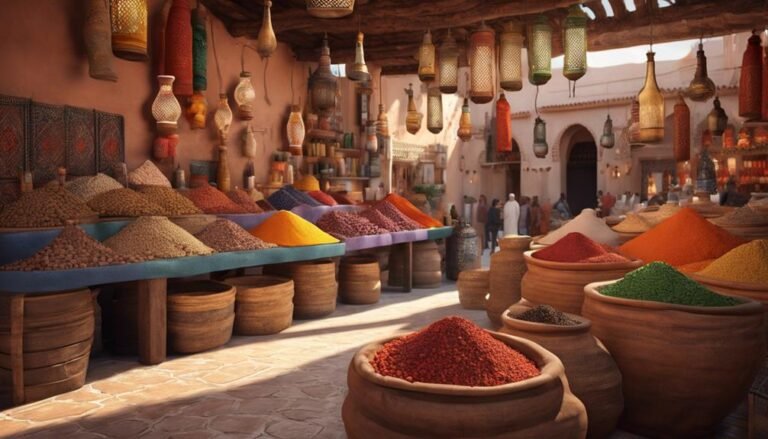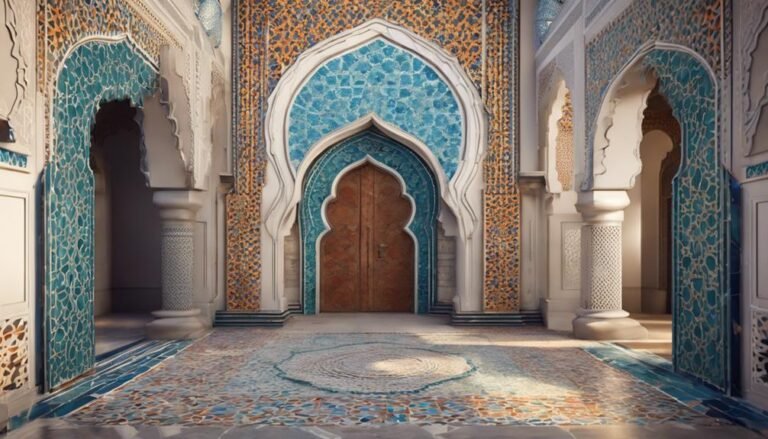Morocco's environmental policies encompass renewable energy projects like solar and wind power, waste management regulations focusing on recycling and waste reduction, water resource conservation through efficient irrigation and drought preparedness, biodiversity protection with wildlife programs and international collaborations. In addition, climate change adaptation plans include green infrastructure investments, sustainable agriculture practices, and disaster preparedness strategies. These policies demonstrate a commitment to environmental sustainability.
Key Takeaways
- Investment in renewable energy projects like solar and wind power.
- Implementation of waste management regulations focusing on recycling and reduction.
- Conservation measures for water resources including irrigation efficiency.
- Strategies for biodiversity protection through wildlife rehabilitation and poaching prevention.
- Climate change adaptation plans with a focus on green infrastructure and disaster preparedness.
Environmental Policy Framework
In Morocco, the environmental policy framework plays a crucial role in shaping the country's approach to sustainability and conservation efforts. The implementation of environmental policies faces various challenges in Morocco, such as limited financial resources, capacity constraints, and the need for improved coordination among different governmental departments.
To address these challenges, the government has been working on enhancing stakeholder engagement strategies. By involving stakeholders from civil society, private sector, and local communities in the policy-making process, Morocco aims to increase transparency, accountability, and effectiveness in implementing environmental policies.
Stakeholder engagement strategies focus on creating platforms for dialogue, consultation, and collaboration to make sure that diverse perspectives and interests are considered. These strategies help in building consensus, fostering partnerships, and mobilizing support for environmental initiatives.
Despite the efforts to improve stakeholder engagement, there are still areas that require further enhancement, such as ensuring meaningful participation of marginalized groups and balancing conflicting interests. Overall, continuous refinement of stakeholder engagement strategies is essential for overcoming policy implementation challenges and advancing Morocco's environmental conservation goals.
Renewable Energy Initiatives
Morocco has been actively investing in renewable energy initiatives, particularly in solar power projects and wind energy developments. These initiatives are aimed at diversifying the country's energy sources and reducing its reliance on fossil fuels.
The government's commitment to these projects highlights Morocco's dedication to sustainable energy practices and environmental conservation.
Solar Power Projects
With an increasing focus on renewable energy initiatives, solar power projects in Morocco have been steadily gaining momentum. The country has made significant strides in enhancing energy efficiency through the implementation of solar technologies.
Morocco's commitment to advancing solar power projects is evident in its utilization of cutting-edge technology advancements to harness solar energy efficiently. By investing in solar infrastructure and promoting the use of renewable energy sources, the nation is paving the way towards a more sustainable future.
The government's support and encouragement of solar initiatives have led to the development of large-scale solar plants and installations across the country. These efforts demonstrate Morocco's dedication to reducing carbon emissions and moving towards a cleaner energy landscape.
Wind Energy Investments
Amidst the renewable energy initiatives in the country, significant investments are being directed towards wind energy projects in Morocco. Wind energy investments not only contribute to the country's renewable energy goals but also bring about various economic benefits and technological advancements. These investments lead to job creation and foster sustainable development in the region. By harnessing the power of wind, Morocco can reduce its dependence on fossil fuels, mitigate greenhouse gas emissions, and create a more environmentally friendly energy sector. The advancements in wind energy technology also pave the way for innovation and expertise in the field, positioning Morocco as a leader in renewable energy within the region.
| Economic Benefits | Technological Advancements |
|---|---|
| Job Creation | Sustainable Development |
| Reduced Costs | Innovation |
| Increased Investments | Enhanced Efficiency |
Waste Management Regulations
In the domain of waste management regulations in Morocco, stringent policies have been implemented to address environmental concerns and promote sustainable practices. Recycling programs play a crucial role in these regulations, encouraging the separation and recycling of materials to reduce the amount of waste sent to landfills. Waste disposal is closely monitored to guarantee that hazardous materials are managed responsibly, minimizing their environmental impact.
The focus on waste reduction is evident in Morocco's waste management regulations, aiming to decrease the overall amount of waste generated. Through public awareness campaigns and educational initiatives, the government encourages citizens to adopt practices that prioritize waste prevention and reuse. Additionally, businesses are required to adhere to strict guidelines for managing their waste output, further contributing to environmental sustainability.
Water Resource Conservation Measures
Morocco's dedication to environmental sustainability extends to the implementation of water resource conservation measures to safeguard this essential natural resource. To enhance water efficiency, Morocco has implemented irrigation efficiency measures such as drip irrigation and precision agriculture techniques. These methods help optimize water usage in agriculture, a sector that accounts for a significant portion of water consumption. Additionally, the country has invested in water recycling techniques to reduce water wastage and guarantee a sustainable water supply for various sectors.
In anticipation of droughts, Morocco has developed robust drought preparedness strategies to mitigate the impact of water scarcity. These strategies include early warning systems, drought-resistant crop varieties, and water-saving practices. Moreover, the country has been focusing on aquifer recharge methods to replenish underground water sources and maintain water levels in aquifers for future use. By adopting these extensive water resource conservation measures, Morocco aims to secure its water supply and promote environmental resilience in the face of growing water scarcity challenges.
Biodiversity Protection Strategies
When considering biodiversity protection strategies in Morocco, it's important to acknowledge the various wildlife conservation efforts implemented to safeguard endangered species and promote ecological balance.
Additionally, ecosystem preservation initiatives play a significant role in maintaining the rich diversity of flora and fauna in the region.
Wildlife Conservation Efforts
With a focus on preserving its diverse wildlife, Morocco has implemented a range of biodiversity protection strategies. The country has established wildlife rehabilitation programs to care for injured or endangered species, aiding in their recovery and eventual release back into their natural habitats.
Additionally, Morocco has implemented stringent poaching prevention measures to combat illegal hunting activities that threaten various species. The government actively collaborates with local communities and international organizations to enhance wildlife conservation efforts.
By promoting awareness and education about the importance of biodiversity, Morocco aims to secure a sustainable future for its unique wildlife populations.
- Wildlife rehabilitation programs
- Poaching prevention measures
- Collaboration with local communities
- International partnerships
- Awareness and education initiatives
Ecosystem Preservation Initiatives
Implementing a wide array of strategies, Morocco actively engages in ecosystem preservation initiatives to safeguard its biodiversity. The country focuses on habitat restoration and conservation measures to protect its diverse ecosystems.
Through targeted efforts, Morocco aims to restore degraded habitats, such as forests, wetlands, and coastal areas, to enhance biodiversity and ecosystem resilience. Additionally, ecosystem monitoring and assessment play a pivotal role in evaluating the effectiveness of conservation actions and identifying areas that require further protection.
Climate Change Adaptation Plans
Morocco's Climate Change Adaptation Plans prioritize enhancing resilience in key sectors to address the challenges posed by changing environmental conditions.
- Investing in Green Infrastructure: Implementing projects like sustainable urban drainage systems and green roofs to manage stormwater and reduce flooding risks.
- Promoting Sustainable Agriculture: Introducing drought-resistant crops, efficient irrigation techniques, and soil conservation practices to adapt to changing climate patterns.
- Enhancing Coastal Protection: Developing strategies such as beach nourishment and mangrove restoration to safeguard coastal areas from sea-level rise and erosion.
- Improving Water Resource Management: Implementing water-saving technologies, promoting efficient water use, and enhancing water storage capacities to cope with water scarcity.
- Strengthening Disaster Preparedness: Establishing early warning systems, conducting risk assessments, and enhancing emergency response capabilities to mitigate the impacts of extreme weather events.
These initiatives reflect Morocco's proactive approach towards climate change adaptation, focusing on building resilience and sustainability across various sectors.
International Collaboration Efforts
Numerous collaborative initiatives have been established to bolster Morocco's environmental policies on an international scale, fostering shared strategies for addressing pressing global challenges. Morocco engages in green technology partnerships and sustainable development agreements with various countries and international organizations. These partnerships aim to promote the exchange of knowledge and resources to drive innovation in renewable energy, waste management, and water conservation.
Furthermore, Morocco has actively pursued eco-friendly trade agreements to promote sustainable practices in its trade relationships. By integrating environmental considerations into trade policies, Morocco aims to reduce its carbon footprint and ensure that economic growth is in harmony with ecological sustainability.
In addition, Morocco participates in carbon offset collaborations, working with other nations to reduce greenhouse gas emissions and mitigate climate change impacts. These collaborations involve projects that sequester carbon or reduce emissions in one region to compensate for emissions elsewhere, contributing to global efforts to combat climate change. Overall, Morocco's international collaboration efforts play an important role in advancing its environmental agenda and contributing to global sustainability goals.
Conclusion
To sum up, Morocco's environmental policies demonstrate a commitment to sustainability and preservation of natural resources. By implementing renewable energy initiatives, waste management regulations, water conservation measures, biodiversity protection strategies, and climate change adaptation plans, the country is taking steps towards a greener future.
Through international collaboration efforts, Morocco is actively contributing to global environmental conservation. Ultimately, Morocco isn't just talking the talk, but walking the walk when it comes to protecting the environment.

The Editorial Team is a passionate group of Morocco enthusiasts dedicated to sharing the beauty, culture, and wonders of this captivating country. With diverse backgrounds and a deep love for travel, we strive to bring you engaging and informative content that inspires your Moroccan adventures. From uncovering hidden gems and sharing local insights to exploring mouthwatering cuisine and showcasing the vibrant lifestyle, our team is committed to providing you with valuable resources and exciting stories that enhance your exploration of Morocco. Join us on this journey as we celebrate the rich heritage and unforgettable experiences that make Morocco truly special.

